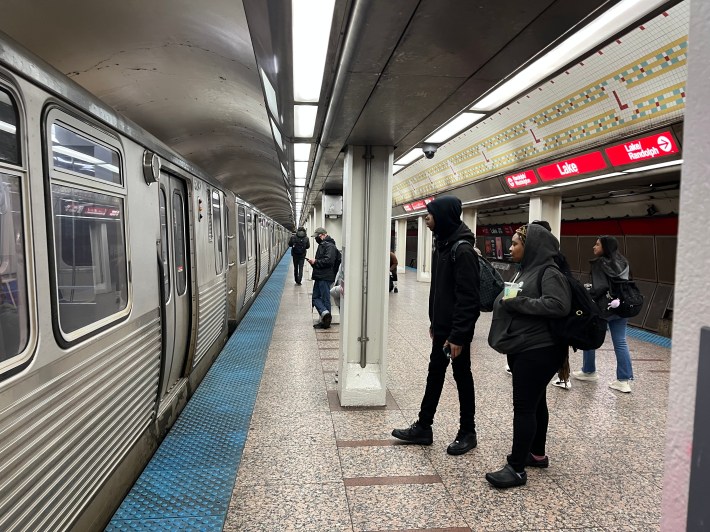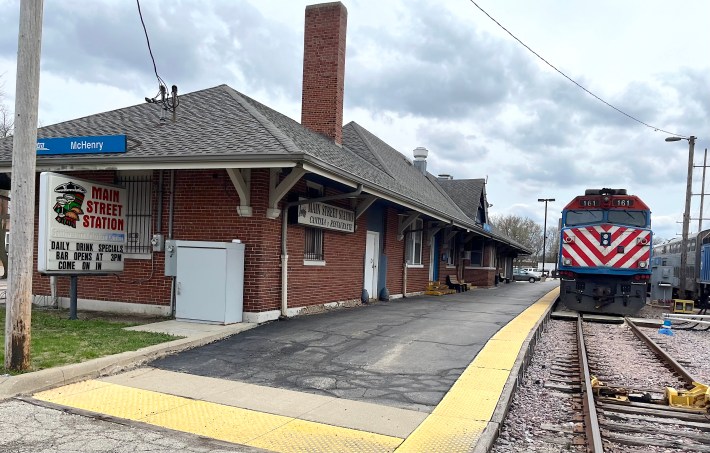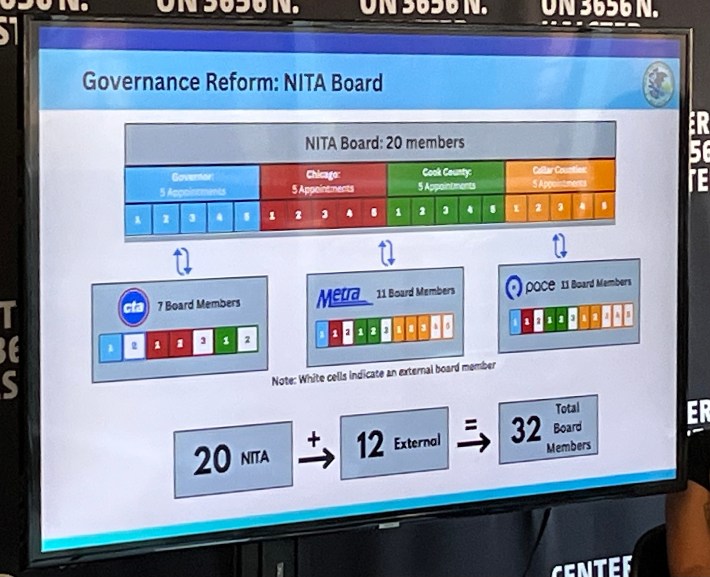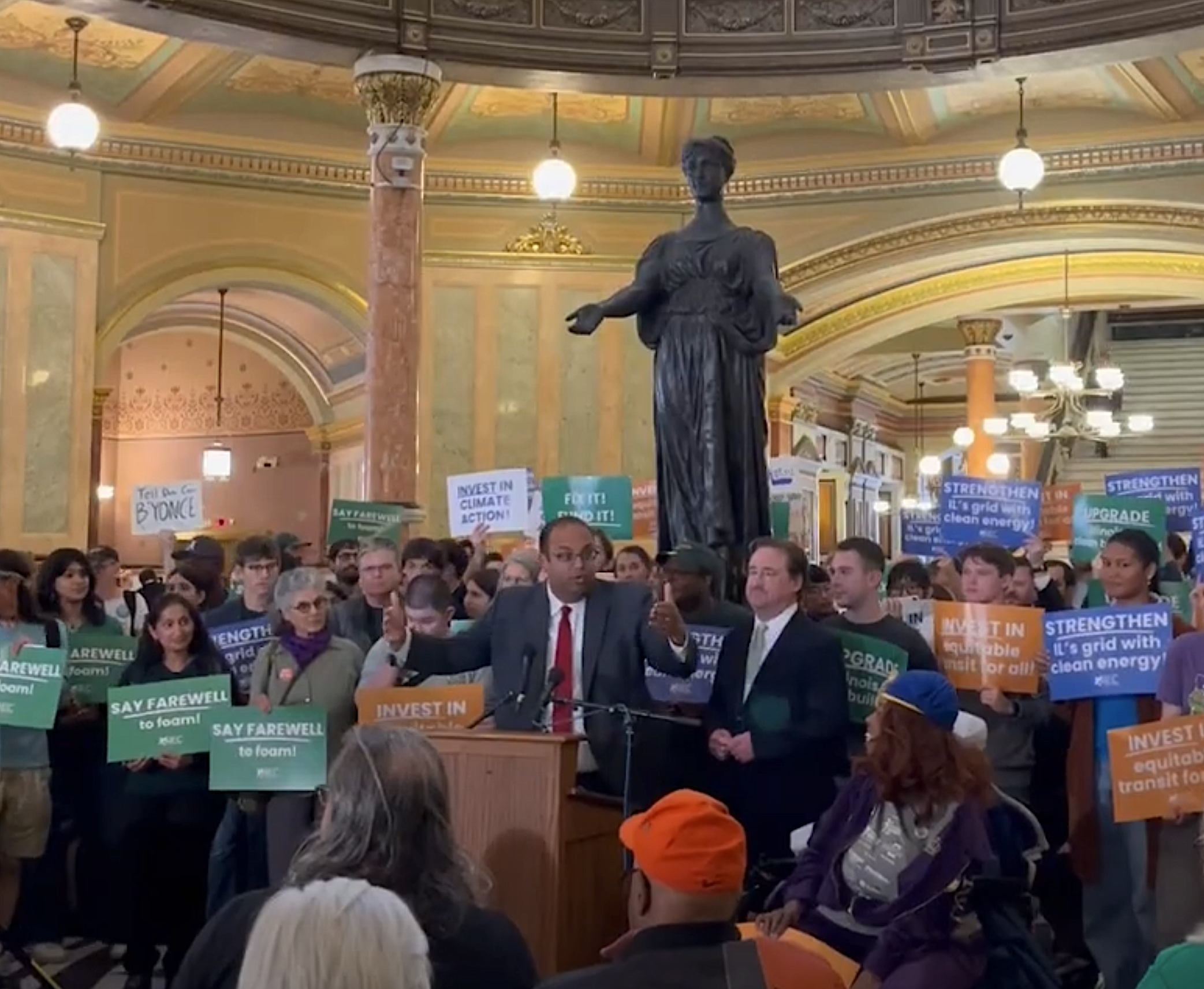
It's getting down to the wire as Illinois legislators try to pass a transit reform and funding bill during their fall veto session, which wraps up next week from Tuesday through Thursday. If they don't approve such legislation soon, the result could be major service cuts and layoffs for the CTA, Metra, and Pace.
One of the lawmakers leading the charge on this issue is State Sen. Ram Villivalam, the Chicago Democrat who sponsored transit bill HB 3438. That measure passed the Senate in the literal eleventh hour of the spring legislative session last May, but the House didn't vote on it. That's why Chicagoland bus and train riders, workers, and advocates are our in our current predicament.
Streetsblog caught up with Villivalam yesterday to get his take on recent happenings, and what the odds are that the General Assembly will pass a robust transit bill next week.
John Greenfield: It seems like the [Regional Transportation Authority] figure for the transit fiscal cliff keeps moving around. Previously it was $771 million, but recently they put it at $202 million, and now I'm seeing $280 million. What numbers are you using nowadays?
Sen. Ram Villivalam: The reality of the situation is that there has been a higher than expected return on the sales tax revenue. The reserves have not been utilized for in the way that it was estimated, I think primarily due to not spending as much on labor and so many other expenses, in terms of the service boards drawing down the funding.

However, with all of that said, the mission needs to stay the same, which is robust reforms that clarify that the [Northern Illinois Transit Authority, the higher-clout replacement for the RTA] has the final say on capital plans on service plans, on a unified fare policy, and essentially all financial decision-making priorities. And I think the fluctuation in the numbers, and the fact that all these agencies are on different pages, is even more highlighting the need for these reforms to be implemented as soon as possible.
JG: It seems like the smaller projected fiscal cliff makes it easier for politicians who are dead-set against new fees and surcharges, such as most of the transit-friendly Republicans I recently interviewed, to say, in effect, "Look, it's not that big of an emergency. Let's just use non-fee financial strategies such as using interest on the Road Fund and interest from the state's Rainy Day Fund to address the immediate problem of that $200-something million cliff, and then we'll figure out the longterm funding and work on governance reform sometime in the future, say the next spring session." What's your response to that attitude?
SRV: First, we have to understand that certain funding mechanisms may sound good, but in reality they will have a detrimental impact. And so I think about the suggestion to reuse $300 million in the Rainy Day Fund interest that exists.
We've heard from the bond houses, we've heard from the governor's team, that would have a negative impact on our fiscal situation and stature and would drastically impact the progress we've made to right our fiscal ship. So utilizing the Rainy Day Fund interest may sound good, but it will have a detrimental impact on our fiscal foundation, so that should not be used as an option.
I'll also add that we cannot have it both ways. We can not expect that to build a world-class public transit system that is safe, reliable, accessible, and integrated for several decades to come, that invests in neighborhood transit and suburb-to-suburb transit, and invests in a completely new safety strategy, and invests in making sure that when a bus is supposed to be there, it's going to be there, if we don't make the transformational investment of $1.5 billion.
And so, yes, there is an option to put a Band-Aid on this and see what happens. But I would just state for the record that if we are expecting to put a Band-Aid on this situation, and a world-class public transportation system to manifest itself, it's not going to happen.

JG: Yeah, it's kind of a "you get what you pay for" situation. And one of the perks of transit as something to invest in, is that a good transit system will generate revenue. It'll basically pay for itself, right? I mean, if Chicagoland becomes known as a region, and Illinois becomes known as a state, with excellent transit, that will make people want to spend money here, visit, start businesses here, correct?
SRV: Absolutely. We've seen time and time again that Chicago and Illinois are recruiting more businesses to the state, and a primary driver of that, if you speak with Google, if you speak with Salesforce, is our public transit system. And we want to continue that trend. In order to do that, we need to ensure safety, reliability, accessibility, affordability and integration. We need to make sure that Pace is connected to CTA, and Metra is connected to CTA, and Pace and Metra are connected, and so much more.
And that will help our economy. For every dollar that goes into public transit, [$13, according to a recent Argonne Libraries and MIT report] is pumped into our local economy. That'll help our environment. We're already the most congested regions in the nation. If a million-plus people have to find a different way to get to their job, their doctor, their school, who currently use public transit, it'll be a whole lot more congested. And I guarantee you nobody is going to want to be going anywhere.
So we have the ingredients. We have to put the ingredients together to make sure we continue to move in the direction of having a more robust public transit system.
JG: At [Thursday's] RTA board meeting, the former mayor of Woodstock, Illinois, who's the board member for McHenry County nowadays [Dr. Brian Sager], complained about the 15-to-five override rule that gives Chicago, Cook County, and the State of Illinois the ability to use a supermajority to overrule the collar counties. They could use that in the other direction as well. But he was concerned that might allow the city, Cook County, and the state to gang up on the collar counties. Any response to that concern?

SRV: First and foremost, it's important to note that there is a provision in the voting structure to allow for two out of five members from each sub-region with a simple majority [12 out of the the 20 total directors] to vote for any final product. The 15 out of 20 provision that is an "or" provision, is there to ensure that if there is someone like a Bruce Rauner [the recent Republican governor who was notorious for refusing to sign a state budget when the Democratic supermajority didn't yield to his demands] who is an obstructionist at every step of the way, they will not be able to hold up an entire agenda, of having a robust public transit system, from happening.
And 15 out of 20 is 75 percent. That means it's not a supermajority as we know it in Springfield. [In the General Assembly, that's 60 percent, the amount of votes needed to pass immediately enacted legislation during the veto session.] It is a super-duper majority, still.
And I would just say thats it's kind of hypocritical for the concern to be the collar counties being cut out by the mayor of Chicago, by the Cook County board president, by the governor. Because if we don't have the 15 out of 20 provision, let's go down their rabbit hole for a minute, they're essentially allowing the mayor of Chicago or the Cook County board president or the governor to have veto power over the collar counties.

If there's a situation where the collar counties have a priority, and maybe another sub-region disagrees, the collar counties will not be at the mercy of one sub-region if they can gather a consensus of 15 board members. So this is an opportunity, in terms of good governance and public policy to have a safety valve to ensure that an obstructionist like Bruce Rauner isn't able to hold up an entire agenda for working families to get to their school, their doctor, and their job.
And it just doesn't make sense for the collar counties to use this argument, because if they're so worried about what the City of Chicago or Cook County is going to do, why would you give them veto authority over a project that might take place in the collars? And so I believe it's sound public policy to have both options, and make sure that we're driving consensus in this new board.
JG: All right. There are a lot of moving parts right now. What is your prediction about whether or not passing a transit reform funding bill is going to happen during the veto session?
SRV: I have been working incredibly really well for the last three years with the House and the Governor's Office, the [Illinois] Clean Jobs Coalition, the Labor for Public Transportation Coalition, to get to this point, having House Bill 3438 pass the Senate, robust reforms that have been negotiated for some time now, and a transformational investment of $1.7 billion in public transit systems across the state. [$200 million of that would be earmarked for Downstate systems.] I know Rep. [Eva-Dina] Delgado and Rep. [Kam] Buckner [co-leaders of the House's Public Transit Working Group] are incredibly intelligent and dedicated on this issue. The Governor's Office has been engaged.
I'm cautiously optimistic that we can work towards a solution. We have to keep in mind that as the House deliberates and the Governor's Office considers proposals, whatever legislation comes out of the House still has to pass the Senate. And so it has to be palatable to enough members of our caucus, enough members of the chamber, in order for it to get sent to the governor. And so we are working diligently to make that happen, and I'm committed to that, and I'm going to continue to give it everything I have.

Do you appreciate Streetsblog Chicago's paywall-free sustainable transportation reporting and advocacy? We officially ended our 2024-25 fund drive in July, but we still currently need $42.5K to complete our budget and keep publishing at full strength in 2026. We'd appreciate any leads on potential major donors or grants. And if you haven't already, please consider making a tax-deductible donation to help us continue publishing next year. Thanks!




